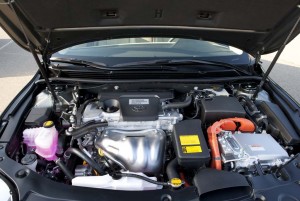Toyota’s big new Avalon will be getting a hybrid drivetrain for the first time, the remake of the full-size sedan to share the powertrain line-up offered in the Japanese maker’s smaller Camry model.
The move underscores Toyota CEO Akio Toyoda’s goal of offering a gas-electric alternative in virtually all products sold for the Japanese giant.
Beyond the addition of a first-ever hybrid, the new Avalon is a significant departure for Toyota. First shown at this year’s New York Auto Show, the 2013 Avalon was developed entirely in the U.S. and features a striking new shape that’s a distinctive new look that’s a striking shift away from Toyota’s traditionally plain vanilla approach to styling.
Set to go on sale late this year, the Avalon will be one of six new models or variants to get a hybrid. The maker earlier this year unveiled the compact Prius C, as well as a plug-in version of the original Prius hatchback.

The Avalon Hybrid will pair a 2.5-liter I-4 with two electric motors to produce up to 200 hp - and 40 mpg.
The gas-electric drivetrain in the new Avalon will be shared with the current Toyota Camry. That means a 2.5-liter inline-four engine paired with two electric motors. In combination they will produce 200 horsepower and the maker claims the Avalon Hybrid will be able to launch from 0 to 60 in just 8.5 seconds, reasonably quick for its class and one of the faster hybrids, in general.
Fuel economy is expected to come in at 40 City, 39 Highway and 40 Combined, though the EPA isn’t expected to make that official until closer to the launch of the 2013 Toyota Avalon line. Like other Toyota hybrids the full-size sedan will be able to creep along in electric vehicle mode at speeds up to about 25 mph for a maximum of approximately 1 mile.
Toyota is sticking with its familiar nickel-metal hydride battery chemistry, rather than migrating to more advanced lithium-ion, as many of its competitors have been doing. According to Avalon Chief Engineer Randy Stephens, NiMH batteries have proven their reliability and have a lower cost than lithium technology. But they also store less energy – limiting battery-only range, for one thing – and take up more space. In a vehicle as big as Avalon, however, space shouldn’t be much of an issue.
The Avalon Hybrid’s impressive fuel economy also reflects efforts to improve the sedans aerodynamics while also reducing its weight. The basic sedan is about 120 pounds later than the 2012 Avalon, despite plenty of added content. Even the Hybrid weighs about 23 pounds less than last year’s model.
The full-size sedan market has been undergoing some radical and unexpected changes in recent months. Hyundai kicked things off with a more lavish and stylish remake of its Azera. Chevrolet will follow for early in the 2014 model-year with an all-new Impala. And Ford is making some notable improvements in the big Taurus sedan.
The Avalon will, however, be the only hybrid in the segment, at least for now. That will get it a significant mileage advantage. The closest any competitor comes in terms of space and fuel economy is the Volkswagen Passat. Though officially designated a midsize it offers virtually as much interior space as the 2013 Toyota Avalon and, with its TDI diesel and a manual gearbox, yields 31 mpg City, 43 Highway.
Camry’s non-Hybrid XLS with a 2.5-liter I-4 will deliver 21 mpg City, 31 Highway and 25 Combined. The bigger 3.5-liter V-6, rated at 268 hp and 248 lb-ft of torque, is expected to get 21/31/24 mpg – while yielding 0 to 60 times of around 7 seconds.
Toyota won’t release pricing until closer to the launch of the 2013 Avalon.

